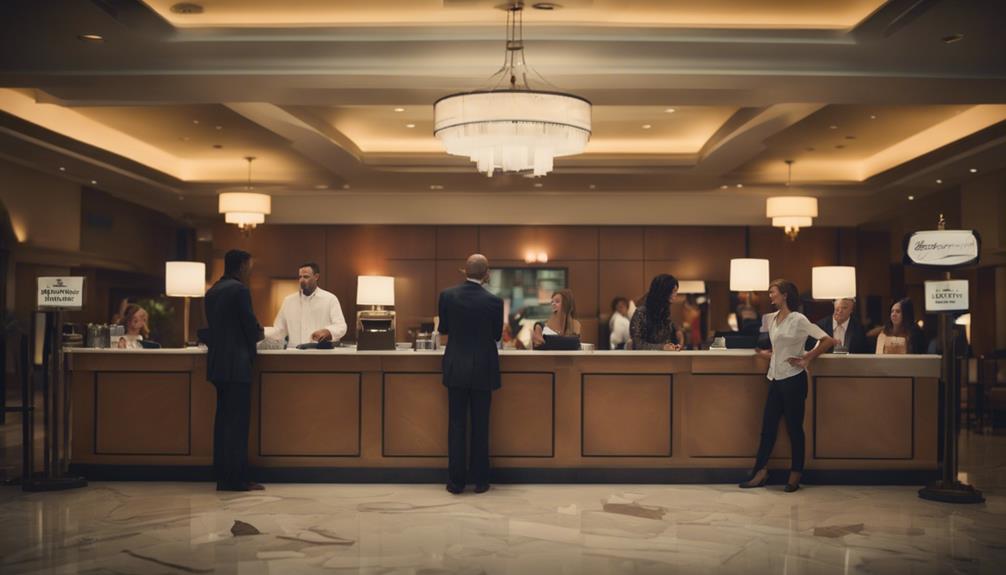Gathering and Acting on Customer Feedback in Hospitality
In the realm of hospitality, the contrast between success and stagnation often hinges on your ability to gather and act on customer feedback.
It's not just about hearing what guests have to say; it's about using that feedback strategically to elevate your service and offerings.
By understanding the importance of customer input and implementing effective feedback mechanisms, you can truly set your establishment apart.
But how exactly can you turn those valuable insights into tangible improvements that keep guests coming back for more?
Key Takeaways
- Customer feedback is a crucial tool for enhancing service quality and guest satisfaction.
- Implementing actionable changes based on feedback drives continuous improvement.
- Acting on feedback boosts reputation, loyalty, and overall guest experience.
- Analyzing feedback data helps identify, prioritize, and implement effective improvements.
Importance of Customer Feedback
Understanding the significance of customer feedback is crucial for improving service quality in the hospitality industry. Feedback analysis provides valuable insights into the experiences of guests, allowing you to pinpoint areas for enhancement.
By actively listening to what customers have to say, you can identify patterns, trends, and specific issues that need attention. Customer insights gained from feedback can serve as a roadmap for making informed decisions that lead to enhanced guest satisfaction.
Analyzing feedback enables you to not only address existing concerns but also to anticipate future needs and expectations. It empowers you to proactively tailor your services to meet customer preferences, ultimately fostering loyalty and positive word-of-mouth recommendations.
Embracing feedback as a tool for continuous improvement demonstrates your commitment to providing exceptional experiences for every guest.
Methods for Collecting Feedback
When it comes to gathering feedback from your customers in the hospitality industry, you can consider surveying guests onsite, utilizing online platforms, and conducting focus groups. These methods provide you with valuable insights into the guest experience, allowing you to make informed decisions to enhance customer satisfaction and loyalty.
Surveying Guests Onsite
To gather valuable feedback from guests during their stay, consider implementing various methods for collecting their insights on their experience. Here are some effective strategies to survey guests onsite:
- Real-time feedback tracking: Utilize tablets or mobile devices for guests to provide immediate feedback on their experience while still on the premises.
- In-person feedback gathering: Train staff to engage guests in conversation, asking for feedback on service, amenities, and overall satisfaction during their stay.
- Immediate response strategies: Develop protocols for addressing feedback promptly, showing guests that their opinions are valued and acted upon.
Utilizing Online Platforms
Consider integrating online survey platforms to gather feedback from guests in a convenient and efficient manner. By utilizing these platforms, you can enhance your online reputation and increase customer engagement. Online surveys allow guests to provide feedback at their own pace and convenience, leading to more responses and insights into their experiences. To help you understand the benefits of online feedback collection, here is a comparison table:
| Online Survey Platforms | Traditional Paper Surveys |
|---|---|
| Instant data collection | Manual data entry required |
| Real-time analytics | Delayed data processing |
| Cost-effective | Printing and distribution costs |
| Higher response rates | Lower response rates |
| Easy to analyze trends | Time-consuming analysis |
Integrating online platforms can streamline feedback collection, boost customer engagement, and enhance your overall online reputation.
Conducting Focus Groups
If you seek to gather more in-depth insights from your guests beyond online surveys, consider conducting focus groups as a dynamic method for collecting feedback. Focus group dynamics can provide a platform for customers to engage in open discussions, allowing for a more nuanced understanding of their experiences and preferences.
Here are three key benefits of conducting focus groups in the hospitality industry:
- Rich Customer Insights: Through group discussions, you can uncover valuable insights into what your guests truly value about your services and where improvements can be made.
- Interactive Feedback Analysis: Focus groups enable immediate feedback analysis as participants share their thoughts, emotions, and suggestions in real-time.
- Enhanced Understanding: By observing group dynamics, you can gain a deeper understanding of the collective opinions and sentiments of your customers.
Utilizing Feedback for Improvement
You can leverage customer feedback as a powerful tool for implementing actionable changes and enhancing the quality of your service.
By actively listening to your guests' suggestions and concerns, you pave the way for continuous improvement and innovation in your hospitality business.
Embrace feedback as a valuable resource that can drive positive transformations and elevate your overall guest experience.
Implementing Actionable Changes
To make meaningful improvements based on customer feedback, it's crucial to promptly identify and prioritize actionable changes that align with your hospitality business's overall goals and values. Implementing actionable changes involves enhancing experiences and improving processes to meet customer expectations effectively.
Here are three essential steps to guide you through this process:
- Review Feedback Data: Analyze customer feedback to identify recurring issues or suggestions for improvement.
- Set Clear Objectives: Define specific goals and outcomes for the changes you plan to implement based on the feedback received.
- Involve Your Team: Collaborate with your staff to develop and implement strategies that address the feedback and align with your business objectives.
Enhancing Service Quality
Enhancing service quality through feedback analysis is a pivotal step in continuously improving your hospitality business's operations and customer satisfaction. By carefully analyzing customer feedback, you can identify areas that require improvement and take targeted actions to enhance your service quality.
Improving communication within your team can help address any issues highlighted by customers and ensure a seamless experience for future guests. Additionally, investing in staff training based on feedback can empower your employees to deliver exceptional service consistently.
Regularly reviewing feedback and implementing changes not only shows your commitment to customer satisfaction but also helps foster a culture of continuous improvement within your hospitality business. Remember, every piece of feedback is an opportunity to refine your services and exceed customer expectations.
Benefits of Acting on Feedback
How can harnessing customer feedback positively impact the growth and success of your hospitality business?
Acting on feedback is crucial for staying ahead in the competitive hospitality industry. By improving service based on customer input, you not only enhance the overall guest experience but also boost your reputation as a customer-centric establishment.
Benefits of Acting on Feedback:
- Enhancing Service Quality:
Implementing feedback allows you to address specific areas that may need improvement, leading to a more refined and personalized service for your guests.
- Building Customer Loyalty:
Showing customers that you value their opinions and actively make changes based on their feedback creates a sense of trust and loyalty towards your brand.
- Increasing Positive Reviews:
When guests see that their feedback is taken seriously and acted upon, they're more likely to leave positive reviews, which can attract new customers and improve your online reputation.
Implementing Feedback in Operations
By actively incorporating customer feedback into your daily operations, you can streamline processes and optimize the overall guest experience. Feedback implementation is crucial for making operational enhancements that align with your guests' preferences. When you receive feedback highlighting areas for improvement, take swift action to address them.
For instance, if multiple guests mention long wait times at check-in, consider adding more staff during peak hours or implementing a digital check-in system. These changes can lead to smoother operations and increased guest satisfaction.
Regularly review feedback trends to identify recurring issues and prioritize solutions. Whether it's enhancing room cleaning procedures based on cleanliness feedback or adjusting menu offerings in response to food quality comments, each adjustment contributes to a better guest experience. Engage with your team to brainstorm creative ways to implement feedback effectively.
Monitoring Customer Satisfaction Levels
To effectively gauge customer satisfaction levels, regularly gather and analyze feedback from various touchpoints throughout the guest journey. By focusing on feedback analysis and response strategies, you can gain valuable insights into how guests perceive their experiences at your establishment. Understanding customer sentiment and feedback trends allows you to make informed decisions to enhance their overall satisfaction.
Here are three key actions to help you monitor customer satisfaction levels effectively:
- Utilize Surveys: Implement surveys at different stages of the guest journey to collect feedback on specific touchpoints such as check-in, dining experiences, and check-out. This structured approach can provide quantitative data for analysis.
- Monitor Online Reviews: Keep track of online review platforms to understand customer perceptions and sentiment. Analyzing both positive and negative reviews can highlight areas for improvement.
- Feedback Analysis Tools: Use feedback analysis tools to streamline the process of extracting meaningful insights from customer comments. These tools can help identify recurring themes and sentiments, enabling you to tailor response strategies accordingly.
Addressing Negative Feedback Effectively
When addressing negative feedback effectively, prioritize understanding the root causes behind customer dissatisfaction to implement targeted solutions. Handling reviews professionally is crucial in maintaining customer trust and loyalty. By actively listening to customer concerns and feedback, you can gain valuable insights into areas that may need improvement. Turning criticism positively by reframing it as an opportunity for growth can help shift the focus from the negative to the constructive.
| Negative Feedback | Effective Response |
|---|---|
| Slow service times | Offer a discount on next visit to make up for the inconvenience |
| Cold food | Apologize, offer a replacement dish, and ensure it is served hot |
| Dirty facilities | Immediately address the cleanliness issue and offer a complimentary service |
| Rude staff | Provide additional training for staff on customer service and offer a sincere apology |
Creating a Feedback-Driven Culture
Foster a culture of continuous improvement by embracing feedback from customers and staff alike to drive positive change within your hospitality establishment. Encouraging open communication channels and actively seeking feedback creates a valuable opportunity for growth and development. Here are three key ways to cultivate a feedback-driven culture:
- Feedback Analysis: Regularly review and analyze the feedback received from customers and staff. Look for patterns, common themes, and areas that require immediate attention. Utilize tools and technology to streamline this process and gain meaningful insights into the feedback provided.
- Feedback Implementation: Act on the feedback received promptly and effectively. Prioritize the areas that need improvement based on the analysis conducted. Involve your team in the implementation process to ensure everyone is aligned and committed to making the necessary changes.
- Continuous Engagement: Foster a culture where feedback isn't only accepted but actively encouraged. Create a feedback loop that allows for ongoing communication and follow-up to monitor the impact of implemented changes. Celebrate successes and acknowledge the efforts put into improving based on feedback received.
Conclusion
So, as you continue to gather and act on customer feedback in your hospitality business, remember that every comment is a stepping stone to success.
Like a river flowing towards the sea, feedback can guide you towards improvement and growth.
Embrace the feedback, analyze it, and take proactive steps to address any issues that arise.
By doing so, you can create a feedback-driven culture that sets you apart in the competitive world of hospitality.







